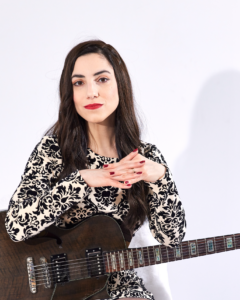Sarah Fard is an educator and musician focused on creating a more accessible and inclusive music scene. She studied jazz guitar and music education at the University of New Hampshire before starting her public school teaching career in Massachusetts in 2009. She has taught a variety of music courses at all grade levels, and currently teaches guitar, popular music ensemble, music technology, and adapted music at Medford High School in Medford, MA.
Sarah earned her Masters in Music Education from Boston University and a Graduate Certificate in Music Education and Autism from the Boston Conservatory at Berklee. She continues her work with the Berklee Institute for Accessible Arts Education by acting as an educational consultant for their private lesson’s program and leading professional development opportunities for music educators. Prior to working with Longy, she also led the collegiate chapter of United Sound at Berklee, an inclusive concert band program for adults with disabilities, for which she was awarded a Berklee Urban Service Award.
An avid advocate for inclusive and relevant teaching methods, Sarah has led workshops for various state music education associations, inclusive arts education organizations, and local colleges and universities. Specifically, Sarah has a focus on bringing popular music education and music literacy opportunities to all learners. She is on a subcommittee for Diversity, Equity and Inclusion committee of the Massachusetts Music Educators Association, is currently working on a book focused on Universal Design for Learning and music education, and continues to be an active performer in the New England area.
Teaching Philosophy
I went into teaching because I believe that everyone has a voice that deserves to be heard, and music can be a powerful tool in doing so. An education in music is an education in empathy, critical thinking, and creativity.
Being a musician shouldn’t be reserved for those that are more privileged, or for those that learn in a specific way. Music connects us all, and should be accessible to all. It is my role as a teacher to spark creativity and foster growth. For that to happen, every prospective musician needs to feel valued and represented. This relates to the music we teach, the methods we use, and the musicians we expose our students to. If it’s not diverse, then we are not doing our best for our students!
Lastly, I believe that when teaching music, I need to not only honor where my students are coming from, but where they are going. Rather, where they want to go. Whether they go on to study music, become a performer, or keep their musicality for themselves, it is my job to support their path. Every student is unique, and that is a beautiful thing.

